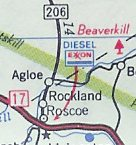
A deeply weird thing I learned this week:
There is a place, a tiny hamlet at a road intersection north of Roscoe, N.Y., that simultaneously & without any contradiction, does and doesn't exist.
everythingisamazing.substack.com/p/the-imaginar…
(1/)
There is a place, a tiny hamlet at a road intersection north of Roscoe, N.Y., that simultaneously & without any contradiction, does and doesn't exist.
everythingisamazing.substack.com/p/the-imaginar…
(1/)

It turns out that our maps are invisibly littered with places that don't exist.
Here's a photo of one: the village of Argleton, West Lancashire.
Now, if you squint *really hard*...
No, please don't do that. It's an empty field.
(2/)
Here's a photo of one: the village of Argleton, West Lancashire.
Now, if you squint *really hard*...
No, please don't do that. It's an empty field.
(2/)

Except - this "village" appeared on the books of estate and letting agents, employment agencies and weather services.
It appeared in the addresses of local businesses. It was on Google Maps, as late as 2009...
And it's always been an empty field.
(3/)
It appeared in the addresses of local businesses. It was on Google Maps, as late as 2009...
And it's always been an empty field.
(3/)
What the actual what? Aren't there people *checking* this stuff?
Yes, of course. They're called cartographers. The incredibly hard-working folk who make our maps.
Reassured? Don't be. *They* made these fake places.
Deliberately.
(4/)
Yes, of course. They're called cartographers. The incredibly hard-working folk who make our maps.
Reassured? Don't be. *They* made these fake places.
Deliberately.
(4/)

By "they" I mean "their predecessors." The reputable cartographers who first surveyed our landscapes - and fought pirates.
Map-making was expensive, so some folk 'cut corners'. Copy a competitor's map, change the colours, stick your own logo on. Hey, who'd know?
(Arrr.)
(5/)
Map-making was expensive, so some folk 'cut corners'. Copy a competitor's map, change the colours, stick your own logo on. Hey, who'd know?
(Arrr.)
(5/)

To prevent their maps being stolen, cartographers injected fantasy into their work.
An imaginary street here.
A non-existent mountain there.
Tiny changes in out-the-way places - acting like a hidden signature, undeniable proof of ownership that'll stand up in court.
(6/)
An imaginary street here.
A non-existent mountain there.
Tiny changes in out-the-way places - acting like a hidden signature, undeniable proof of ownership that'll stand up in court.
(6/)

That's how Agloe, N.Y. was created.
The name is an anagram of the initials of Otto G. Lindberg and Ernest Alpers of General Drafting, one of the “Big Three” main publishers of road maps in the U.S. between 1930 & 1970.
Agloe is fake to the core.
But now it gets weirder.
(7/)
The name is an anagram of the initials of Otto G. Lindberg and Ernest Alpers of General Drafting, one of the “Big Three” main publishers of road maps in the U.S. between 1930 & 1970.
Agloe is fake to the core.
But now it gets weirder.
(7/)

In the 1950s, some enterprising soul looked at this empty intersection, & said to themself, “You know, with a few groceries & a lot of love I could make a real *go* of this place.”
They grabbed an Esso map to get the name right - and so the Agloe General Store was born.
(8/)
They grabbed an Esso map to get the name right - and so the Agloe General Store was born.
(8/)

Skip forward a few years.
Mapmakers Rand McNally (one of the other “Big Three”) releases its own state map. And someone at Esso (which bought General Drafting’s map data) spots “Agloe" & presumably thinks “aha! Got you, you thieving b---”.
Up step the lawyers.
(9/)
Mapmakers Rand McNally (one of the other “Big Three”) releases its own state map. And someone at Esso (which bought General Drafting’s map data) spots “Agloe" & presumably thinks “aha! Got you, you thieving b---”.
Up step the lawyers.
(9/)
Rand McNally's winning defence:
Of *course* Agloe is a real place. Not only is it on the official state maps...look! There's a general store. There are *people* there.
npr.org/sections/krulw…
(/10)
Of *course* Agloe is a real place. Not only is it on the official state maps...look! There's a general store. There are *people* there.
npr.org/sections/krulw…
(/10)
Sadly, Agloe General Store is no more - and the town is now officially erased from maps.
But a curious detail: the Wikipedia entry says, as of 2020, there is "1 inhabitant".
Yeah, Wikipedia. I know. Eyebrow raised: everythingisamazing.substack.com/p/week-2-2-is-…
Nice to imagine, though.
(11/)
But a curious detail: the Wikipedia entry says, as of 2020, there is "1 inhabitant".
Yeah, Wikipedia. I know. Eyebrow raised: everythingisamazing.substack.com/p/week-2-2-is-…
Nice to imagine, though.
(11/)
And if the name "Agloe" is ringing any bells - yes, it's *that* one:
npr.org/2015/07/29/427…
Agloe is indeed a Paper Town.
(12/)
npr.org/2015/07/29/427…
Agloe is indeed a Paper Town.
(12/)
For more on this story, plus a link to the foulest & most unprintable street-name you will ever read in your life (I promise!), check out my @Substack newsletter on it here:
everythingisamazing.substack.com/p/the-imaginar…
(13/)
everythingisamazing.substack.com/p/the-imaginar…
(13/)
And finally, that gorgeous pic that I used to start this thread is via a chap called Clay Banks, at Unsplash:
unsplash.com/photos/yBAgX-o…
(Ta for that, sir.)
Thanks for reading!
(/Fin)
unsplash.com/photos/yBAgX-o…
(Ta for that, sir.)
Thanks for reading!
(/Fin)
Also - if you liked how head-scratchingly ludicrous that Agloe story is, here's an even barmier one for you:
https://twitter.com/Mikeachim/status/1392468208922337280
• • •
Missing some Tweet in this thread? You can try to
force a refresh







